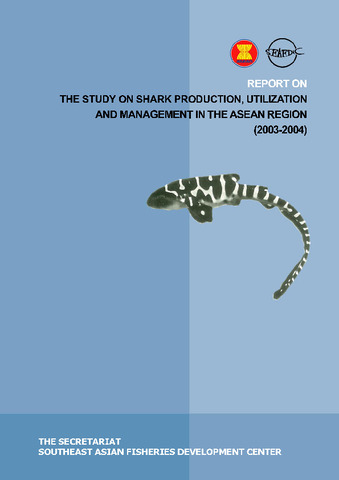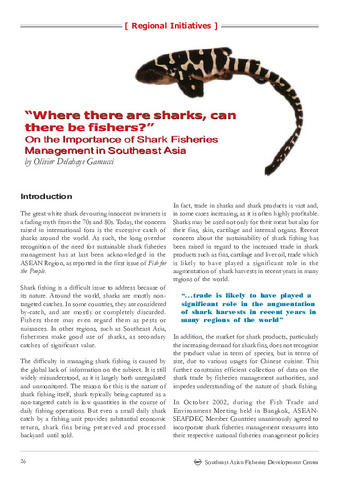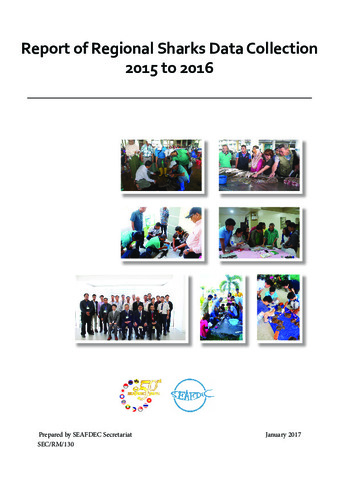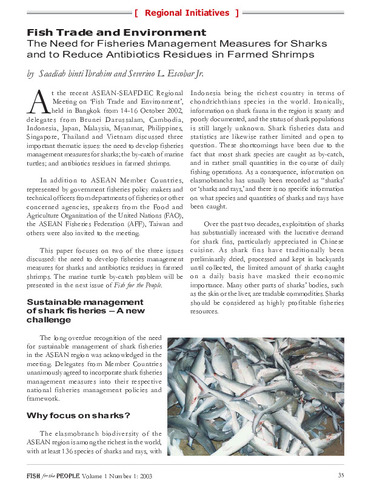Report on the study on shark production, utilization, and management in the ASEAN region, 2003-2004
Share
Abstract
During the ASEAN-SEAFDEC Millennium Conference, Fish for the People, held in Bangkok in November 2001, the ASEAN member countries noted the external pressure put by the global community on the need to comprehensively address shark species management-related issues.
The “International Plan of Action for Conservation and Management of Sharks” or IPOA-Sharks was subsequently developed and endorsed by the member nations of COFI in October 1998, among them the ASEAN-SEAFDEC member countries.
The ASEAN member countries, which prevailing common position is that the management of commercial fisheries including those catching sharks should come under the purview of the FAO, have since 2001 taken several actions that will lead to the formulation of NPOA-Sharks.
They also recognized the need to carry-out the required actions suggested by the IPOA-Sharks through the initiation of an ad-hoc study supported by SEAFDEC that looked, from 2003 to 2004, into shark catches, biology, use, and trade in the region.
It was confirmed by this study that shark catches in the ASEAN region are mostly from small-scale fisheries. It is also a supplementary "cash" catch. The fishermen from small-scale fisheries make a living from the sharks and they do not practice "fining" since every parts of sharks are valuable and fully utilized.
Shark fins is only one of the by-product of the shark catches in ASEAN, although a very important one. Meat and many of the shark products are also used and sold by fishermen. Singapore was found to be an important place for the global trade of shark fin.
Another finding from the study is that shark dermal denticles for fin species identification can be used as the denticles have a specific shape at certain particular area for each species, although this method is not recommended to identify shark species from dried fin.
There is certainly a vast difference of capacity between ASEAN member countries, in terms of technical skills, manpower and financial resources, and they are therefore developing their NPOAs at different paces. Even so, all ASEAN countries have now initiated the development of their Shark Plan. Two countries, Malaysia and Thailand, are now entering the implementation phase while the others are going through their drafting, with stakeholder consultation and awareness building exercises. It is important to note that many ASEAN countries are strongly constrained by a lack of funds and limited manpower as they are many more urgent issues to address at the national level such as development and poverty alleviation.
The development and implementation of NPOA-Sharks will show that fisheries catching sharks, like all other fisheries, are appropriately utilizing marine resources and can be managed by the ASEAN governments in a sustainable manner.
Suggested Citation
SEAFDEC. 2006. Report on the Study on Shark Production, Utilization and Management in the ASEAN Region 2003-2004, Southeast Asian Fisheries Development Center, Bangkok, Thailand. 229 pp.
Subject
Related items
Showing items related by title, author, creator and subject.
-
"Where there are sharks, can there be fishers?" On the importance of shark fisheries management in Southeast Asia
Gamucci, Olivier Delahaye (Secretariat, Southeast Asian Fisheries Development Center, 2003)An overview on the importance of shark fisheries management in Southeast Asia is given. In particular recent progress in the region, status and trends of shark fisheries, utilization and trade of shark are given. -
Report of regional sharks data collection 2015 to 2016: Results from data collection in sharks project participating countries
Southeast Asian Fisheries Development Center (Secretariat, Southeast Asian Fisheries Development Center, 2017)One-year study on shark data collection had been implemented from 2015 to 2016 in collaboration with six (6) SEAFDEC Member Countries with technical support from SEAFDEC Marine Fisheries Research and Development Department ... -
Fish trade and environment: The need for fisheries management measures for sharks and to reduce antibiotics residues in farmed shrimps
Ibrahim, Saadiah binti; Escobar Jr., Severino L. (Secretariat, Southeast Asian Fisheries Development Center, 2003)




